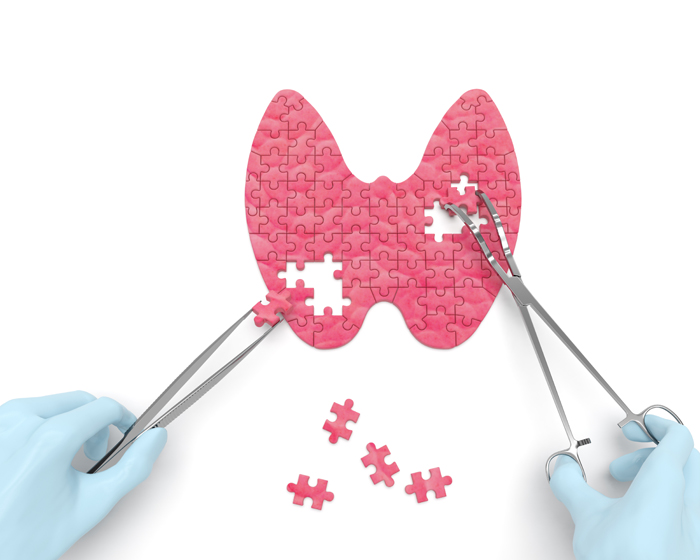Thyroid Gland Removal Surgery in Chembur, Mumbai
The thyroid is a butterfly-shaped gland located in front of your neck, under your voice box. It is composed of two lobes or wings on either side around your windpipe; these lobes are connected by a narrow strip of tissue called the isthmus. The thyroid secretes hormones that regulate body metabolism. Due to some diseases, the size or functioning of the thyroid gland gets affected. While most cases of thyroid malfunction can be treated with medicines, some may necessitate the removal of the gland.

What does Thyroid Removal Entail?
Thyroidectomy is the surgical removal of the entire thyroid gland or a part of it. Thyroidectomy is a minimally invasive procedure and does not require a long hospital stay.
Do You Qualify for Thyroid Removal?
Your doctor may recommend you thyroid removal surgery for the following reasons:
- You are diagnosed with thyroid cancer.
- You have recurrent thyroid cysts.
- You have goiter (an abnormal enlargement of the thyroid gland).
- You have enlarged thyroid nodules obstructing your food pipe or windpipe causing difficulties in swallowing or breathing, respectively.
- You are suffering from hyperthyroidism (excess production of thyroid hormone due to an overactive gland).
- You are suffering from Graves’ disease (an autoimmune disease causing inflammation of the thyroid gland and overproduction of thyroid hormone).
Why is Thyroid Removal Done?
Thyroidectomy is done to provide you relief from the above conditions. In such cases as above, treatment with only medicines may take a long time to alleviate your symptoms. Or, they may not be effective at all. Hence, surgery is recommended.
Types of thyroid removal surgery
There are many approaches to thyroidectomy.
Depending on the level of removal, there are the following types:
- Lobectomy: If only one of the two lobes is inflamed or swollen, your surgeon will remove only the affected one. This helps retain partial thyroid function.
- Subtotal thyroidectomy: Your surgeon will remove the gland but leave some thyroid tissue. This preserves some of the functioning of the gland.
- Total thyroidectomy: Your surgeon will remove the complete gland. This is done when the entire gland is affected or in the case of thyroid cancer.
Depending on the level of invasion required, there are the following types:
Conventional thyroidectomy: The surgeon makes a horizontal incision in front of your neck directly accessing the thyroid gland. This is the most commonly practiced technique. The major drawback of this procedure is that it gives you a scar.
Scarless Procedures: These are minimally invasive and don’t leave a scar as in the conventional method.
- Endoscopic thyroidectomy: A small cut is made in your neck to insert the surgical equipment and a camera to guide the surgery.
- Transoral thyroidectomy: In this procedure, the surgeon makes a small cut inside your mouth. This prevents the need for a neck incision. Another technique is incision under the chin that often goes unnoticed.
- Robot-assisted transaxillary surgery (RATS): An incision is made in the armpit.
Is Thyroid Removal Beneficial?
Thyroid Removal is beneficial to alleviate the symptoms of cancer, hyperthyroidism, etc. You may need additional therapy but the immediate danger of the disease is arrested.
Risks Associated with Thyroid Removal Surgery
Just like any surgical procedure, thyroidectomy also has some risks involved. Common risks are:
- Blood loss.
- Injury to parathyroid glands, located close to the thyroid gland. This may lower the calcium level in the body as parathyroid glands control the regulation of calcium.
- Minimal risk related to anesthesia.
- Risk of infection.
- A small risk of injury to the recurrent laryngeal nerves that control your vocal cord. This may affect your voice.
Conclusion:
Thyroidectomy helps treat diseases that affect the thyroid gland and help prevent the development of cancer and other complications in the future. It involves the partial or total removal of the malfunctioning thyroid gland. Treatment from an expert thyroid specialist may lower the risks associated with the procedure.
Seek medical consultation by a thyroid removal doctor near you.
You can request an appointment at Apollo Spectra Hospitals, Chembur, Mumbai.
Call 1860 500 2244 to book an appointment.
During the procedure, you will be given anesthesia so you will not feel any pain. Post-surgery you will have some pain but pain medicines are given to relieve that. Most patients complain of pain while swallowing for a few days after surgery but that also resolves gradually.
During your hospital stay you may have pain and soreness in your throat and may experience soreness in your upper back muscles and shoulders. You find difficulty in swallowing. But gradually your pain and discomfort will go away. You will be put on pain-relieving and several other medicines to recover fast.
This depends on the extent of removal of your thyroid. You will require lifelong hormone therapy if a total thyroidectomy is done.
You will recover in a week or two. Take your medicines regularly and follow your surgeon’s instructions properly at home to recover faster.
Yes, you can live a normal, healthy life after surgery. But you may need to take synthetic thyroid hormone to prevent hypothyroidism (low thyroid hormone level in the body).
Symptoms
Our Top Specialities
NOTICE BOARD
CONTACT US
CONTACT US
 Book Appointment
Book Appointment


.svg)
.svg)
.svg)
.svg)








